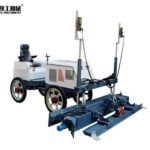Laser concrete leveling machine is a self-propelled or towable device designed to level and finish freshly poured concrete with exceptional accuracy. Different from traditional manual methods that rely on human effort and basic tools, laser-guided systems use advanced laser technology to ensure uniformity across large areas. This machine is equipped with a laser receiver, a hydraulic screed head, and a computerized control system that adjusts the screed’s height in real time, maintaining the exact elevation required for the project. The primary goal of this equipment is to eliminate human error, reduce labor costs, and accelerate project timelines.
How Does Concrete Laser Leveling Equipment Work?
The operation of a laser concrete leveling machine hinges on three core components: the laser transmitter, the laser receiver, and the hydraulic screed system.
Laser Transmitter Setup: A rotating laser transmitter is placed at a known elevation, typically on a tripod, within the construction site. This transmitter emits a 360-degree laser beam, creating a reference plane for the machine to follow.
Laser Receiver Integration: The machine’s screed head is fitted with a laser receiver that detects the laser beam’s position. As the machine moves forward, the receiver continuously communicates with the transmitter, ensuring the screed remains at the correct height.
Screeding Process: The screed head, often equipped with vibratory mechanisms, spreads and compacts the concrete while eliminating air pockets. This dual-action process creates a dense, smooth surface ready for finishing.
Benefits of Using Laser Concrete Leveling Machine
The adoption of concrete aser leveling machines offers a multitude of advantages over traditional methods. Let’s delve into the key benefits that make this equipment a game-changer in construction.
- Precision and Consistency
Laser-guided machines eliminate these variables by relying on a fixed laser reference plane. The result is a perfectly flat surface with minimal deviations, meeting even the most demanding F-number requirements for floor flatness. - Accelerated Project Timelines
Laser leveling machines can cover vast areas much faster than manual crews. This efficiency reduces labor costs and allows projects to stay on schedule, avoiding costly delays. - Labor Cost Reduction
A laser machine, however, can replace multiple laborers, significantly cutting down on wages, insurance, and safety risks associated with large crews. - Enhanced Surface Durability
The vibratory action of the screed head compacts the concrete effectively, reducing air voids and increasing density. This results in a stronger, more durable surface less prone to cracking, curling, or settling over time. - Versatility in Application
Laser concrete leveling machines are adaptable to various project types, from small residential slabs to massive industrial floors. They can handle different concrete mixes, slopes, and textures, making them suitable for warehouses, parking garages, retail spaces, and more.
Applications of Laser Leveling Machine for Concrete
- Industrial Warehouses: Ensures level surfaces for smooth operation of forklifts and storage systems.
- Commercial Buildings: Provides flat and aesthetic floors for retail spaces and offices.
- Residential Projects: Ideal for basements, garages, and large floor areas in homes.
- Airport Runways and Hangars: Delivers the flatness required for aircraft movement and maintenance.
- Parking Garages: Creates durable and even surfaces to support vehicle traffic and drainage.
- Sports Complexes: Offers smooth foundations for gymnasiums, basketball courts, and skating rinks.


